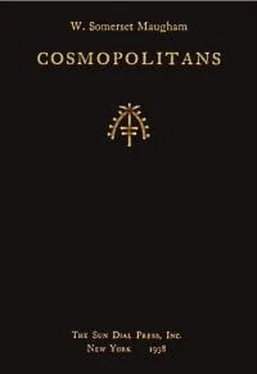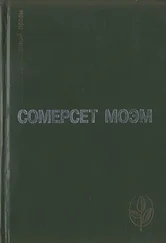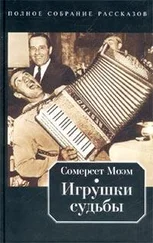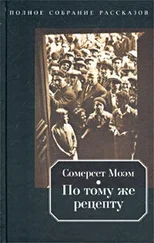Уильям Моэм - Cosmopolitans
Здесь есть возможность читать онлайн «Уильям Моэм - Cosmopolitans» весь текст электронной книги совершенно бесплатно (целиком полную версию без сокращений). В некоторых случаях можно слушать аудио, скачать через торрент в формате fb2 и присутствует краткое содержание. Город: New York, Год выпуска: 1938, Издательство: The Sun Dial Press, INC., Жанр: Классическая проза, short_story, на английском языке. Описание произведения, (предисловие) а так же отзывы посетителей доступны на портале библиотеки ЛибКат.
- Название:Cosmopolitans
- Автор:
- Издательство:The Sun Dial Press, INC.
- Жанр:
- Год:1938
- Город:New York
- ISBN:нет данных
- Рейтинг книги:5 / 5. Голосов: 1
-
Избранное:Добавить в избранное
- Отзывы:
-
Ваша оценка:
- 100
- 1
- 2
- 3
- 4
- 5
Cosmopolitans: краткое содержание, описание и аннотация
Предлагаем к чтению аннотацию, описание, краткое содержание или предисловие (зависит от того, что написал сам автор книги «Cosmopolitans»). Если вы не нашли необходимую информацию о книге — напишите в комментариях, мы постараемся отыскать её.
Cosmopolitans — читать онлайн бесплатно полную книгу (весь текст) целиком
Ниже представлен текст книги, разбитый по страницам. Система сохранения места последней прочитанной страницы, позволяет с удобством читать онлайн бесплатно книгу «Cosmopolitans», без необходимости каждый раз заново искать на чём Вы остановились. Поставьте закладку, и сможете в любой момент перейти на страницу, на которой закончили чтение.
Интервал:
Закладка:
“What were you doing in the summer time?”
“Saving your presence, I sang, I sang all day, all night.”
“You sang. Why, then go and dance.”
I do not ascribe it to perversity on my part, but rather to the inconsequence of childhood, which is deficient in moral sense, that I could never quite reconcile myself to the lesson. My sympathies were with the grasshopper and for some time I never saw an ant without putting my foot on it. In this summary (and as I have discovered since, entirely human) fashion I sought to express my disapproval of prudence and common sense.
I could not help thinking of this fable when the other day I saw George Ramsay lunching by himself in a restaurant. I never saw anyone wear an expression of such deep gloom. He was staring into space. He looked as though the burden of the whole world sat on his shoulders. I was sorry for him: I suspected at once that his unfortunate brother had been causing trouble again. I went up to him and held out my hand.
“How are you?” I asked.
“I’m not in hilarious spirits,” he answered.
“Is it Tom again?”
He sighed.
“Yes, it’s Tom again.”
“Why don’t you chuck him? You’ve done everything in the world for him. You must know by now that he’s quite hopeless.”
I suppose every family has a black sheep. Tom had been a sore trial to his for twenty years. He had begun life decently enough: he went into business, married, and had two children. The Ramsays were perfectly respectable people and there was every reason to suppose that Tom Ramsay would have a useful and honourable career. But one day, without warning, he announced that he didn’t like work and that he wasn’t suited for marriage. He wanted to enjoy himself. He would listen to no expostulations. He left his wife and his office. He had a little money and he spent two happy years in the various capitals of Europe. Rumours of his doings reached his relations from time to time and they were profoundly shocked. He certainly had a very good time. They shook their heads and asked what would happen when his money was spent. They soon found out: he borrowed. He was charming and unscrupulous. I have never met anyone to whom it was more difficult to refuse a loan. He made a steady income from his friends and he made friends easily. But he always said that the money you spent on necessities was boring; the money that was amusing to spend was the money you spent on luxuries. For this he depended on his brother George. He did not waste his charm on him. George was a serious man and insensible to such enticements. George was respectable. Once or twice he fell to Tom’s promises of amendment and gave him considerable sums in order that he might make a fresh start. On these Tom bought a motor-car and some very nice jewellery. But when circumstances forced George to realize that his brother would never settle down and he washed his hands of him, Tom, without a qualm, began to blackmail him. It was not very nice for a respectable lawyer to find his brother shaking cocktails behind the bar of his favourite restaurant or to see him waiting on the box-seat of a taxi outside his club. Tom said that to serve in a bar or to drive a taxi was a perfectly decent occupation, but if George could oblige him with a couple of hundred pounds he didn’t mind for the honour of the family giving it up. George paid.
Once Tom nearly went to prison. George was terribly upset. He went into the whole discreditable affair. Really Tom had gone too far. He had been wild, thoughtless, and selfish, but he had never before done anything dishonest, by which George meant illegal; and if he were prosecuted he would assuredly be convicted. But you cannot allow your only brother to go to gaol. The man Tom had cheated, a man called Cronshaw, was vindictive. He was determined to take the matter into court; he said Tom was a scoundrel and should be punished. It cost George an infinite deal of trouble and five hundred pounds to settle the affair. I have never seen him in such a rage as when he heard that Tom and Cronshaw had gone off together to Monte Carlo the moment they cashed the cheque. They spent a happy month there.
For twenty years Tom raced and gambled, philandered with the prettiest girls, danced, ate in the most expensive restaurants, and dressed beautifully. He always looked as if he had just stepped out of a bandbox. Though he was forty-six you would never have taken him for more than thirty-five. He was a most amusing companion and though you knew he was perfectly worthless you could not but enjoy his society. He had high spirits, an unfailing gaiety, and incredible charm. I never grudged the contributions he regularly levied on me for the necessities of his existence. I never lent him fifty pounds without feeling that I was in his debt. Tom Ramsay knew everyone and everyone knew Tom Ramsay. You could not approve of him, but you could not help liking him.
Poor George, only a year older than his scapegrace brother, looked sixty. He had never taken more than a fortnight’s holiday in the year for a quarter of a century. He was in his office every morning at nine-thirty and never left it till six. He was honest, industrious, and worthy. He had a good wife, to whom he had never been unfaithful even in thought, and four daughters to whom he was the best of fathers. He made a point of saving a third of his income and his plan was to retire at fifty-five to a little house in the country where he proposed to cultivate his garden and play golf. His life was blameless. He was glad that he was growing old because Tom was growing old too. He rubbed his hands and said:
“It was all very well when Tom was young and good-looking, but he’s only a year younger than I am. In four years he’ll be fifty. He won’t find life so easy then. I shall have thirty thousand pounds by the time I’m fifty. For twenty-five years I’ve said that Tom would end in the gutter. And we shall see how he likes that. We shall see if it really pays best to work or be idle.”
Poor George! I sympathized with him. I wondered now as I sat down beside him what infamous thing Tom had done. George was evidently very much upset.
“Do you know what’s happened now?” he asked me.
I was prepared for the worst. I wondered if Tom had got into the hands of the police at last. George could hardly bring himself to speak.
“You’re not going to deny that all my life I’ve been hardworking, decent, respectable, and straightforward. After a life of industry and thrift I can look forward to retiring on a small income in gilt-edged securities. I’ve always done my duty in that state of life in which it has pleased Providence to place me.”
“True.”
“And you can’t deny that Tom has been an idle, worthless, dissolute, and dishonourable rogue. If there were any justice he’d be in the workhouse.”
“True.”
George grew red in the face.
“A few weeks ago he became engaged to a woman old enough to be his mother. And now she’s died and left him everything she had. Half a million pounds, a yacht, a house in London, and a house in the country.”
George Ramsay beat his clenched fist on the table.
“It’s not fair, I tell you, it’s not fair. Damn it, it’s not fair.”
I could not help it. I burst into a shout of laughter as I looked at George’s wrathful face, I rolled in my chair, I very nearly fell on the floor. George never forgave me. But Tom often asks me to excellent dinners in his charming house in Mayfair, and if he occasionally borrows a trifle from me, that is merely from force of habit. It is never more than a sovereign.
French Joe
IT WAS CAPTAIN BARTLETT who told me of him. I do not think that many people have been to Thursday Island. It is in the Torres Straits and is so called because it was discovered on a Thursday by Captain Cook. I went there since they told me in Sydney that it was the last place God ever made. They said there was nothing to see and warned me that I should probably get my throat cut. I had come up from Sydney in a Japanese tramp and they put me ashore in a small boat. It was the middle of the night and there was not a soul on the jetty. One of the sailors who landed my kit told me that if I turned to the left I should presently come to a two-storey building and this was the hotel. The boat pushed off and I was left alone. I do not much like being separated from my luggage, but I like still less to pass the night on a jetty and sleep on hard stones; so I shouldered a bag and set out. It was pitch dark. I seemed to walk much more than a few hundred yards which they had spoken of and was afraid I had missed my way, but at last saw dimly a building which seemed to be important enough to suggest that it might be the hotel. No light showed, but my eyes by now were pretty well accustomed to the darkness and I found a door. I struck a match, but could see no bell. I knocked; there was no reply; I knocked again, with my stick, as loudly as I could, then a window above me was opened and a woman’s voice asked me what I wanted.
Читать дальшеИнтервал:
Закладка:
Похожие книги на «Cosmopolitans»
Представляем Вашему вниманию похожие книги на «Cosmopolitans» списком для выбора. Мы отобрали схожую по названию и смыслу литературу в надежде предоставить читателям больше вариантов отыскать новые, интересные, ещё непрочитанные произведения.
Обсуждение, отзывы о книге «Cosmopolitans» и просто собственные мнения читателей. Оставьте ваши комментарии, напишите, что Вы думаете о произведении, его смысле или главных героях. Укажите что конкретно понравилось, а что нет, и почему Вы так считаете.










